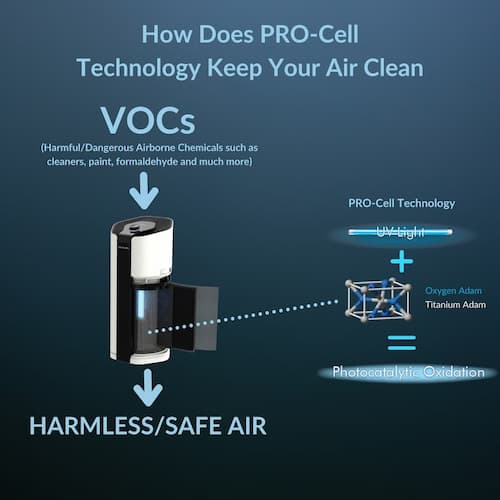What are the Health Benefits of an Air Purifier?

Still trying to decide whether to get an air purifier? You may already know that air purifiers are designed to improve indoor air quality. What you may not know is that the health and wellness benefits go beyond just being able to breathe easier.
Air pollution has been linked to many adverse health conditions, including heart disease, cancer, diabetes, cognitive impairment and general mortality. And the problem isn’t just with outdoor air. According to the U.S. Environmental Protection Agency (EPA) , many air pollutants are 2 to 5 times worse indoors — and the average American spends 90% of their time inside.
Getting an air purifier can greatly improve physical and mental well-being. Here are some of the health benefits of having an air purifier in your home or office.
- Allergy Relief
- Asthma & Respiratory Health
- Removing
Harmful Chemicals & VOCs

- Reducing Airborne Illness
- Clean Air Improves Sleep
- Better Cognitive
Function

- Lower Risk of Diabetes
- Reducing Blood Pressure
More than 50 million Americans suffer from allergies, and they’re the sixth-leading cause of chronic illness. For many people — especially those with seasonal allergies — dust mites, pollen and pet dander are common allergy triggers.
An air purifier with an H13 HEPA filter will remove at least 99.97% of airborne particles as small as 0.3-microns from the air — and can remove particles even smaller. This covers most of the particulate matter that causes allergic reactions. A Yoshi Medical Journal study found that six weeks of using a HEPA air purifier significantly reduced how much medication allergy sufferers needed to control symptoms. This means better overall health and less money spent on medication.
Air purifiers have also been shown to provide relief for respiratory illnesses. Breathing in polluted air irritates the lungs and throat, which aggravates pre-existing conditions and also increases the risk of developing a chronic condition. Removing these particulates and sanitizing the air can alleviate symptoms and lower risks.
Experts worldwide support these claims. One year-long study published in the Lung India journal found that HEPA filter use dramatically improved lung health in asthma patients. The U.S. Centers for Disease Control (CDC) has stated that prolonged exposure to air pollutants is a big factor in developing chronic obstructive pulmonary disease, also known as COPD. Better air quality is a must for long-term lung health.
Many common household items, such as cleaning products and new mattresses, contain a variety of chemicals and volatile organic compounds (VOCs). While some are harmless, others can be very dangerous, especially when they become airborne. Symptoms range from eye and throat irritation to nausea, dizziness, anxiety and depression.
Many air purifiers are equipped with activated carbon filters that trap chemical contaminants. They also filter out the accompanying odors, leaving your home with clean air and a fresh smell. A purifier is especially crucial for painting, cleaning and other activities with a higher risk of releasing VOCs into the air.
Another one of the big benefits of using an air purifier is reducing the spread of toxins that cause people to get sick. They can do so in two ways. The EPA has determined that HEPA filters effectively trap many viral particles, including those associated with the coronavirus and COVID-19.
Many purifiers also contain a UV-C lamp. These attack viruses, bacteria, germs and mold spores, making them unable to reproduce so they die off faster. UV-C light has been used for decades to reduce the spread of airborne, waterborne, and surface contaminants in both commercial and residential settings.
Now let’s look at some of the specific ways cleaner air can improve your well-being. Several studies have shown that worse air quality is associated with shorter, less restful sleep. Other studies have found that higher air pollution can increase the risk of sleep apnea, respiratory problems, and even central nervous system issues.
Adding an air purifier, especially one with a HEPA filter, will reduce irritants so your body can focus on getting rest. This is notably true for those with allergies or respiratory conditions. And their sound can make the perfect white noise to help your mind block out distractions and doze off.
Research has long shown a link between outdoor air pollution and reduced cognitive abilities — and studies indicate the same is true indoors. Poor air quality can reduce awareness and comprehension, and it also lowers productivity. The effect is even greater if you also got a poor night’s sleep due to bad air.
One multi-part study published in Environmental Health Perspectives demonstrates just how much of an affect clean air can have. Participants who were breathing in higher-quality air performed much better in a variety of cognitive functions — in particular those involving decision-making. Cleaner air can also reduce stress and improve mental outlook.
More than 420 million people worldwide have diabetes, and about 1.5 million people every year die due to complications from this disease. It may surprise some to learn that air pollution may be a factor. A study in Denmark found a strong correlation between levels of PM2.5 — short for Particulate Matter 2.5, which are fine particles 2.5-microns or smaller — and the risk of developing diabetes. Using a portable air purifier to remove these fine particles from your home or office will reduce your exposure and can lower diabetes risk.
Better air quality is good for cardiovascular health in many ways, and blood pressure is the most notable. Multiple studies have shown that reducing exposure to fine particulate matter, whether by using a portable filtration system or wearing a face mask, will also lower blood pressure levels. Links have also been found between air pollution levels and the risk for heart disease and stroke, and air pollution can even increase resting heart rate.
 US Dollars
US Dollars
